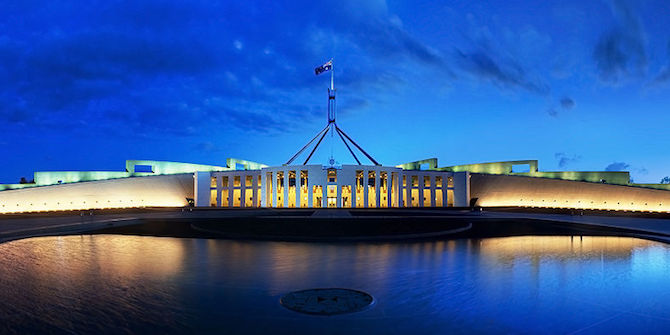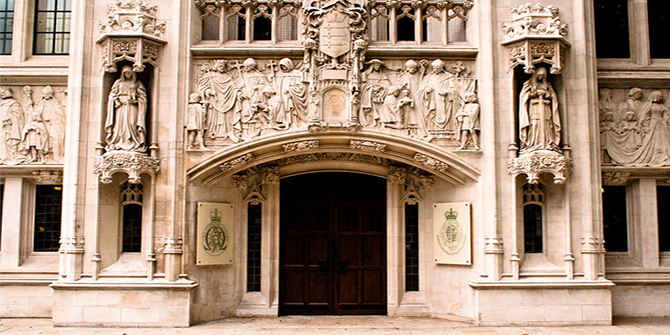 Portraying the Commonwealth as a group of trading partners who share similar values and that will bolster the UK’s influence and prosperity after Brexit is at best delusional, writes Fred Carver. He argues that while the Commonwealth can be used as a diplomatic network in certain cases, it should not be used as a catch-all excuse for trade and foreign policy issues arising from Brexit.
Portraying the Commonwealth as a group of trading partners who share similar values and that will bolster the UK’s influence and prosperity after Brexit is at best delusional, writes Fred Carver. He argues that while the Commonwealth can be used as a diplomatic network in certain cases, it should not be used as a catch-all excuse for trade and foreign policy issues arising from Brexit.
What is the Commonwealth?
The Commonwealth is not a trading block. On that the experts are clear. It is not a geographic block. It has no political or executive functions and seems unlikely to develop in that direction any time soon. There was some suggestion that the Commonwealth could reinvent itself as a community of shared values – a progressive opt-in alternative to some of the less selective global or regional groupings. A noble goal, it now appears that opportunity has been missed. The lack of political support for a values-driven Commonwealth was demonstrated when the 2013 Commonwealth Summit and subsequent presidency was awarded to a regime in Sri Lanka that was under investigation by the United Nations for massacring civilians in the thousands. Perhaps it was inevitable that a network that emerged from empire would have similarly archaic values: 20 commonwealth members impose the death penalty and 36 criminalise homosexuality.
 Parliament House, Canberra, Australia. JJ Harrison (CC BY-SA 3.0)
Parliament House, Canberra, Australia. JJ Harrison (CC BY-SA 3.0)
The Commonwealth had a better past record when it came to defending democracy: it nobly opposed the disenfranchisement of South Africa’s majority community under its apartheid government and more recently suspended Fiji, Nigeria and Pakistan following military coups. But given the Commonwealth currently boasts a member which recently re-elected their President with 98.79% of the vote on a 98.15% turnout, it is stretching credibility to suggest that the Commonwealth could find a raison d’etre as a defender of democratic principles.
It performs some humanitarian and developmental work, although it is a relatively small player: its £50 million annual budget making it less than an eighth the size of Oxfam. This work also has its critics: a DfID report on multilateral donors placed the Commonwealth Secretariat bottom of its list of agencies according to the metric: “match with UK development objectives” and cited it as one of four “poorest performers” and one of two agencies who “have not done enough” following a previous assessment that also listed it among the “poorest performers”.
The Commonwealth is further burdened by its problematic colonial history, the legacy of an empire that the UK has done too little to come to terms with. Other former imperial powers have arguably come further. The Dutch, as the superpower that immediately preceded British hegemony, have provided a blueprint for growing old gracefully and managing the nation’s transition into mid-level force for good with global reach. Dutch schools do not sugar-coat the nation’s imperial legacy, and the Netherlands have pointedly not established a Dutch Commonwealth.
Yes, France has its Francophonie and Portugal its Community of Portuguese Language Countries (CPLP), but neither country expects these organisations to perform important foreign policy functions for them. Where France looks to have influence in the Francophonie it pays for it in full: such as by its significant investment in troops and materiel for its interventions in the Central African Republic and Mali.
In this context, some of the language coming out of the UK about the role the Commonwealth could play in bolstering the UK’s post-Brexit global influence and prosperity appears at best delusional, and at worst a reimagining of an Empire 2.0. The Commonwealth pursues very few joint initiatives, sport aside, and less than 10% of UK trade exports go to Commonwealth countries.
Nevertheless, the Commonwealth does have its potential uses. It is, as Lord Ahmed, minister for the UN and for the Commonwealth, told the House of Commons Foreign Affairs Committee, a network. Networks, both formal and informal, with their various overlapping memberships, form the backbone of multilateral diplomacy independent of the reason for which they were formed. The Commonwealth has an interesting and diverse membership including rising African (South Africa and Nigeria) and BRIC (India) powers, several Small Island Development State (SIDS) members and significant overlap with the G77 and NAM states. As such it has the potential to help the UK build bridges to the General Assembly at a time when such relations are at a low ebb.
However, networks are only as useful as the use they are put to. It is currently unclear what, if any, use the UK intends for its Commonwealth network. As the House of Commons Foreign Affairs Committee said in its response to the Government the FCO must “clarify what it is about common membership of the Commonwealth that distinguishes the UK’s relationships with … Commonwealth members and … set out a long-term vision for the UK’s relationship with the Commonwealth.”
Were the Commonwealth network to be harnessed in support of shared priorities at the UN – be they on gender equality, reform of the UN’s development system, or modern slavery – then it could play a useful role in mobilising action at the General Assembly and its various committees. But if nothing concrete is placed on the table, or if too much is expected, or too little invested, or if the UK continues to fail to come to terms with its colonial and postcolonial legacy, then the risk remains that the Commonwealth will offer little more than a distraction to the true task of developing a meaningful foreign policy for the post-Brexit age.
______
 Fred Carver is the Head of Policy for the United Nations Association – UK, leading the organisation’s policy development. He works with the Campaigns and Outreach teams on the policy content of their projects, and also has a particular focus on UNA’s work on UN Peacekeepers.
Fred Carver is the Head of Policy for the United Nations Association – UK, leading the organisation’s policy development. He works with the Campaigns and Outreach teams on the policy content of their projects, and also has a particular focus on UNA’s work on UN Peacekeepers.
All articles posted on this blog give the views of the author(s), and not the position of LSE British Politics and Policy, nor of the London School of Economics and Political Science.








The only people who ever mention the empire or empire 2 are remainders leave have never made any claims as to wanting to return to the expensive to run empire, we are leaving a would be empire after all.
I fail to understand why in academia we still regard ourselves as a trading nation when we have trade deficits, stemming from the deindustrialistion policies under Thatcher, and produce trade deficits from that period averaging £2-£3 billion a month, month in month out. We are a net importer of other countries finished goods not exporter.
Looking into the future unless we become the equivalent of those we now rate as third world countries, we can’t possibly compete against them because they have access to exactly the same technology that we have.
Inside or outside Europe we face the same problems, Neo-Liberal theology and the race to the bottom. Instead of competing with the rest of the world how about cooperating with any willing government and planning all our needs based the resources we have available.
We are a sovereign country with our own currency, which means we can purchase anything within our own country, that means concentrating on investing in whatever our society needs, which should include investing in industries that reduce if not cancel out our need to import.
It isn’t rocket science but there is only so much raw material resources in the world and with the emerging countries those resources will start to become scarce, China is already well ahead on that game and has taken logical action that maintains their supply.
Trade for trade sake is not a 21st century sustainable vision, and lacks credibility, we need to look at China and seek an alternative vision based on sustainability, not viewing the world from a telescope going back to 1800s.
While I do not dispute the basic message being portrayed in this article about the nature of the Commonwealth, I must take issue with a couple of comments made, namely that:
1. The statement that “the Commonwealth is further burdened by its problematic colonial history, the legacy of an empire that the UK has done too little to come to terms with”; and
2. The statement that “the role the Commonwealth could play in bolstering the UK’s post-Brexit global influence and prosperity appears at best delusional, and at worst a reimagining of an Empire 2.0.
As such, and, if I may, I will start with point2.
As one of those who campaigned with the official Vote Leave Campaign, I can assure everyone that at NO time did we ever mention the former British Empire or that Brexit would allow the UK to return to its position of power and influence at the height of the Empire. To do so would almost certainly have resulted in the majority of people laughing in our faces because the British people are not so stupid or unfamiliar with the current power, soft or hard, that the UK exerts in the modern world. We would also have opened ourselves, quite rightly, to the charge of trying to return Britain back into the semi-racist state that existed at the height of the Empire.
However, we did make it clear that we owed a debt to the former British colonies and one of the ways that we could do that is to re-open the free trade that we had with the former colonies as a means to bring them deeper into the world trade sphere which, yes, would also have the benefit, for example, of reducing tariffs on and thereby the costs to British shoppers of such things as New Zealand lamb, Indian and Sri Lankan tea and African and West Indies coffee etc.
As to my first point, unless something radical has happened to the education system in the UK since I was at school, I was under the impression British children are taught all about the Empire and things such as the slave trade. So it cannot be said that the UK has not come to terms with the legacy this has left. I should also point out that the UK is the only former Western colonial power that holds a “Black History Month”, although I admit that this is a relatively recent development. And regardless of whether it could be considered for reasons of historic guilt, it cannot be denied that the UK is by far the largest single aid donor to the developing members of the Commonwealth.
Also, while the Commonwealth may have been formed as the historical daughter of the Empire, it was formally constituted by the London Declaration in 1949, which established the organisation as one of free and equal members who are independent states, and NO countries were forced to join the organisation. In fact, the Commonwealth is so respected that even countries that were never part of the former British Empire are now members of the organisation, such as Cameroon, Mozambique, Rwanda and Tanzania.
Many thanks for this comment. We will agree to disagree as to if the UK is doing enough to come to terms with its colonial past but just for the record Tanzania was a British colony from 1919 to 1961 and half of Cameroon was also a British colony.